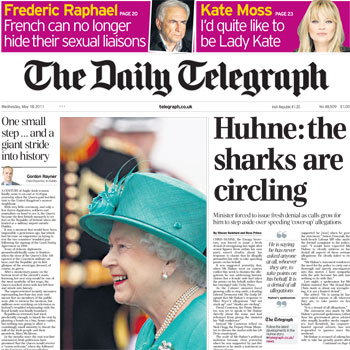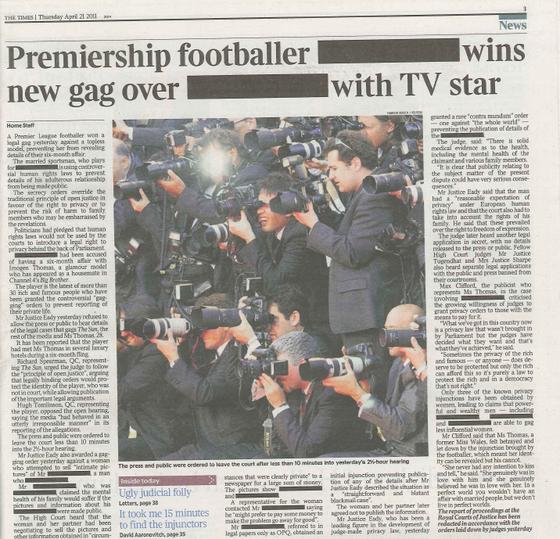Archive
Service has been resumed…
Sorry for the prolonged break. This has been caused by an unprecedented – and to me, unaccustomed – lengthy stint of freelance work, complicated by a paroxysmal fit of laughter brought on by reading a Polly Toynbee article in the Guardian, which caused me to suffer complications to an old war wound and led to me being laid up for about a month or so.
I’ve recently noticed a lot of pingbacks to my blog from over a year ago about the Christchurch earthquake and the Guardian’s reporting on it (https://louseandflea.wordpress.com/2011/02/22/the-guardian-newsblog-and-the-death-of-journalism). Has this become some part of a journalism course or something? I’m nearly famous…
Coming up: my thoughts on 24-hour TV news. Give me a day or so to think out my thinks on this.
The anti-Leveson backlash begins!
 Well, it was only a matter of time.
Well, it was only a matter of time.
The tedious, long-running, press-bashing, minor-celeb tufty hunt that is the Leveson Inquiry has finally wrought a backlash.
And leading the charge are the lefty-libertarians at spiked, which has launched The Counter-Leveson Inquiry.
In his article announcing the launch, spiked editor (and Telegraph blogger) Brendan O’Neill notes that ones re-opening the inquiry on Monday, Lord Leveson mention he found ‘publicly expressed concerns’ about the inquiry ‘troubling’.
O’Neill comments:
The most remarkable thing about Leveson’s admission to feeling troubled by public criticisms is that, sadly, there has been very little public criticism of his showtrial of the tabloids. You could count on one hand, or at a stretch two hands, the number of journalists and politicians who have dared to question the right of one judge to marshal celebrities and coppers to the cause of redefining the ethics of the press.
Quite so. There has been the usual drooling over the attacks on the Murdoch tabloids by the more totalitarian-inclined of our “liberal” lickspittle media – The Guardian, The Independent, the BBC etc – but the rest of the mainstream media has generally cowered in the corner, with only the Mail‘s Paul Dacre putting up any semblance of a fight in what is really a kangaroo court.
And it is a kangaroo court. Witnesses line up and grab their allotted 15 minutes of fame – or, the case of faded celebrities and failed politicians, to grab another 15 minutes of celebrity – making whatever allegations fits their agenda of vengeance, outrage, paranoia and shamelessness. There is no forensic cross-examination of these allegations such as would occur in a court of law, either criminal, where the criteria is beyond reasonable count, or civil, where the criteria is the balance of probabilities.
Instead, they are met with gentle questions eliciting their feelings, impressions and thoughts more appropriate for a student counselling session than a formal, quasi-judicial inquiry. For many of the witnesses, this is true nirvana: not only do have a spotlight of a softer, more flattering hue cast upon them, they get a free ego-massage thrown in too.
One troubling aspect of the Levenson inquiry that O’Neill doesn’t comment on in his article – strangely, since it’s one of his hobby-horses – is that by almost solely attacking the tabloids, this is really just another extended prole-bash. The tabloids cater for a sizeable readership who loves celeb gossip; some of the tabs catered to this demand by nefarious means, by illicit phone-hacking or paying cops for tip-offs of celeb shenanigans etc. Of that there’s no doubt.
But hang on: during the Leveson recess, we had the unedifying sight of the usual suspects – the aforementioned Guardian, Independent, BBC etc – drooling over “hacked” documents “proving” that the right-wing US Heartland Institute, which takes a robust anti-man-made global warming line, along with many other activities, was plotting to use the untold millions it gets from Big Oil to foil pro-climate changee scientists by “dissuading teachers from teaching science”.
The fact the central “strategy” document was a crudely cobbled-together fake and that the genuine documents – which were blandly routine meeting reports that hardly showed Heartland wallowing around in Big Oil bucks like Scrooge McDuck – had been obtained by fraud by pro-climate change activist, Peter Gleick, who has since confessed to the phishing, though not to the faking.
That they had tacitly supported and thereby endorsed illegal activities because it suited their news agenda in this instance did not seem to faze then usual suspects. Indeed, the Guardian even ran an extraordinary piece by The Ethics of Climate Change author James Garvey in which he said:
Was Gleick right to lie to expose Heartland and maybe stop it from causing further delay to action on climate change? If his lie has good effects overall – if those who take Heartland’s money to push scepticism are dismissed as shills, if donors pull funding after being exposed in the press – then perhaps on balance he did the right thing. It could go the other way too – maybe he’s undermined confidence in climate scientists. It depends on how this plays out.
So: the ends justifies the means, eh? But only if it’s the Guardian’s ends, it would seem. It certainly doesn’t apply to those filthy red-tops’ ends. Some may call that moral relativism. I call it rank hypocrisy.
But don’t expect such high-minded shenanigans to get even a mention at Leveson. It’s the tabloids which are in the firing line, and while it’s them, the usual suspects will happily cheer the inquiry on.
But O’Neill is surely right to note that whether they are active cheerleaders or cowering curs, mainstream journalists are oblivious to the bonfire which is being built under their feet:
It is alarming that, in a country where the poet John Milton demanded freedom of the press more than 350 years ago, and where many other writers and activists subsequently fought tooth-and-catapult to expel state forces from the worlds of writing and publishing, so many should now acquiesce to an inquiry which gives a judge and his chums the power to tell the media what its morals should be.
O’Neill ends his call to arms with another fiery quote from Milton which I urge you to check out for yourself. Because whatever you might think of their views on other topics (which I myself have a love/hate relationship with), on this issue, the spiked gang is definitely on the side of the angels.
Ode to Roy Greenslade
Hypocrisy flows as freely through Fleet Street as the river Fleet that give it its name once flowed (before it got clogged with human and animal effluent, bodies, shopping trolleys and the 18th-century equivalent of copies of Heat and the Evening Standard).
But there is cheerful Fleet Street hypocrisy and there’s cynical hypocrisy which reveals a nastier side of the writer’s soul: the latter being the sort that makes you want to physically deposit human effluent and shopping trolleys over what you have just read.
Tonight’s Evening Standard provides just such an example of the latter, with the Pythia of Journalism, Roy Greenslade, pontificating thusly under the headline “Why I believe it’s all over for James Murdoch”:
Rupert Murdoch’s son James is a busted flush…[bore, fart etc…much stuff about the House of Commons media select committee. Finally…] At every turn, the name of James Murdoch will continue to feature in headlines. He cannot run and he cannot hide. His game is well and truly up.”
Well, OK. If you say so Roy. Those of us with a longer memory of yesterday’s chip wrapper (and indeed can remember when newspapers were allowed to be yesterday’s chip wrapper) recall times when your antagonism toward Murdoch had a slightly more, er, financial angle.
So here, with apologies to Lewis Carroll, is a little poem:
“You are old, Father Greenslade,” the young man said,
“And with Robert Maxwell you once were so tight;
Yet you stand on your head to attack Murdoch J. —
Do you think, at your age, it is right?”
Phone hacking: The Revolution devours its children
Excellent comment from Fleet Street Blues about how David Leigh, investigations editor of The Guardian, is now in the frame for his self-admitted hacking into a phone. Oh, says the Guardian, between mouthfuls of humble pie, it wasn’t for “tittle-tattle”. It was for “investigating corruption and bribery”. Fair enough. Still illegal, though. Tittle-tattle, corruption- and bribery-busting, intellectual-profiles: if the means by which you gather these things are illegal, sorry, you’re nicked my beauty. What is it about the word “illegal” you up-yourself ponces do not understand?
As FSB said way back when this whole scandal first broke, journos have long used illegal, immoral and sometimes criminally dangerous ways to get stories. Yes…and? If they got away with it, well, they got a front page splash, maybe a promotion or a bonus and a round of drinks in the pub. If they got caught, they got hauled up before the beak fined or, rarely but occasionally, chucked in the nick, and when got out, a round of drinks in the pub.
Let’s not forget what has been behind the holier-than-thou stance of the Guardian and the BBC on this matter: the chance for a good round of Murdoch-whacking.
The Guardian has been caught out with its hypocritical knickers down with Leigh (I see Guido has another pop today), and I suspect there may be others to scurry blinkingly out into the limelight from Rusbridger Cathedral.
Then there is the BBC. Is it whiter than white? I suspect not, but I do not know. What I do suspect is that if someone manages to lift Auntie’s skirt, there will probably be an almighty stink, most probably from the direction of Panorama. I thought it odd of the Beeb to have Peston covering this whole affair. I mean, the Business Editor? Strange call: the US and EU economies are going to hell in a handcart, but never mind that, you haul in your Business Editor to cover a story about media phone hacking.
What’s that all about?
The fourth plinth: Surely the place for Rupert
For some years, I’ve argued that the vacant fourth plinth in Trafalgar Square should be occupied by a statue of a great man, Joseph Bazalgette, the Victorian civil engineer who single-mindedly cleared central London of its slums, created the embankments and Battersea (and other) parks and rid London of the great pestilence of cholera forever. The capital still relies on his sewers today. And they still work.
But increasingly, I’ve come to the conclusion – a difficult one for a New Zealander – that the honoured place should go to an Australian: Rupert Murdoch. For he is the only one who has carried the robust free speech traditions of Cobbett, Horne Tooke, Hazlett, Paine, Johnson and Coleridge into the 21st-century – and willingly paid for it, often to his cost – when the panty-waisted likes of Rusbridger (minor), Toynbee, Thompson, Hari, Snow, Kelner et al stood around saying “oooh, let’s play nice!”, so politically correct they shit where they stand lest they befoul minority toilet bowls.
Don’t get me wrong: Murdoch has his faults. He really needs to see “man made” global warming for the expensive, anti-scientific scam it is, for instance. But on many matters – many of them important, such as freedom of speech – he is on the side of angels.
Where’s the beef?
Day 3 and the duck story is still at stage 4, going on stage 5. The Baby Farm that is BBC News wishes it could get beyond that, but unfortunately they, as always, rely on the Guardian to provide the facts of a huge Watergate-style corruption-going-all-the-way-to-the-top scandal. Fat chance! Personally, if I wanted to investigate a huge Watergate-style corruption-going-all-the-way-to-the-top type scandal, I’d out-source it.
Maybe to someone like honorary Open University doctor Mary Louisa. I know it’s hot in Tuscany at the moment, but heat rash doesn’t necessarily mean she’ll rabbit on about the Scott Trust Ltd being an offshore tax dodge or anything. Richard Murphy would have a fit if she did, and we can’t have that. But who knows? Maybe Our Pol could come up with something useful for once in her sad, deluded life. That would be one-up on her dad.
When something sounds too good to be true…
…it usually is.
I say this apropos to nothing in particular, other than to suggest this well-worn saw from trading standards officers is one that, though they may scoff, journalists should always bear in mind. Particularly if they’ve authored a barely literate book about how gullible other journalists are. Anyone noticed how many holes there are in this flat earth of ours these days? Perhaps we should ask someone, maybe a publicity-seeking MP who’s not a “l33t hax0r“, to look into them. Oh, they already have.
Personally, I never believe anything I read in the press unless it has the Johann Hari Stamp of Intellectual Profile Approval™ on it.
The Indy’s magical monarchist moment
Her Maj’s historic (© all newspapers, airwaves, bandwidth) to Ireland dominates the front pages of the heavies today, but one particularly stood out from the newspaper rack I passed this morning.
Most went for the traditional “beautiful handbag and smiling hat” pictures. The Times:
The Guardian:
The Torygruff takes another tack, going for a deep, tightly cropped headshot, but none too successfully:
(Instead of looking out of the page, if she had been facing the other way, toward the lead story on les travails de Huhne, it might explain what she’s laughing at.)
But best of all for its unusual, striking treatment and its witty pairing one historic event with another is The Independent:
Should the Guardian give up its unhealthy obsession with Justin Bieber?
The Pythia of Journalism has a revealing post comparing various national papers’ “audience” divided into print, web and “social media” (for which read: Twitter).
It contains this infograffiti, taken – inevitably – from the media blog de nous jours, The Media Blog:
Pythia, using all the accumulated knowledge of grub street back stabbing and opportunistic job-hopping that today secures you a sinecure as “Professor of Journalism” at City University London, opines thusly:
As Sturgeon readily concedes, it’s only a snapshot. But it is revealing all the same. Note, for example, the Daily Mail’s enormous reach in print and online compared to a relatively small social media (Facebook and Twitter) following. The Guardian, by contrast, has almost as many social media fans and followers as it has daily visitors to its website. Its reach is, arguably, more penetrating.
Well, that’s one way of looking at it, I suppose. Another way of looking at it might be this, and this. And comparing it with this.
But that’s by the by. Let’s look at another of Pythia’s points, which is that the Guardian’s reach is, arguably, more penetrating. In what way could the Guardian’s obsession with Twitter be more arguably penetrating?
Oddly, I think I found the answer in Sam Leith’s Arts Column in yesterday’s…well, Guardian 2, actually:
My current favourite fact about human civilisation is that fully 3% of all activity on Twitter consists of conversations about [Justin] Bieber. That is, 3% of an entire communicative medium – on which any and every idea in human history can potentially be discussed – is spent on talking about Bieber.
Could it be that a lot of the Guardian’s arguably penetrating social media reach is really just twittering about an 18-year-old Canadian pop singer with backwards-facing hair? Does a good 3% of that dark blue block next to the Guardian in the graph above actually comprise furrow-browed Guardianistas earnestly tweeting each other about the recent egging of Justin Bieber in a Sydney concert hall?
I do not pretend to know. But if so, the Guardian must stop this arguably more penetrating obsession.
UPDATE: More on the Guardian’s twitter obsession. Apparently, according to Frédéric Filloux, news coverage of the death of Osama bin Laden showed how news organisations “have mastered social media such as Twitter”.
Quite apart from ignoring the fairly mundane fact that however you get the news – via Twitter, Facebook, heard it from a bloke in the pub or messenger pigeon – you still have to do the routine, basic journalistic work of verification and actually writing it up into readable prose, Filloux unwittingly betrays the extent to which media organisations are in awe of shiny new media while forgetting those first principles.
For instance, he links to this startling piece of infograffiti (I use that phrase to indicate that, like graffiti, it gives more pleasure to the perpetrator than the hapless viewer). It purports to show how news of the terrorist’s death was spread via Twitter:
Wasn’t that interesting? Well actually, no. It is, in the useful phrase of P J O’Rourke, informationally subtractive: you know less about the subject after looking at it than you did before.
I’m going to alert Peter Sands to this particularly egregious example of the infograffitist’s art, as he has a good blog posting on this sort of nonsense.
Injunctions: The Good, The Bad & The Super
The traditional media silly season has kicked off a bit earlier this year. Rather than waiting for the traditional starting gunshot that is Parliament dissolving, packing its buckets and spades and heading off for the hols, the media is indulging itself in a frenzy of increasingly hyperactivity over Wills ‘n’ Kate, Cam ‘n’ Clegg (uncunningly disguised as the AV referendum) and the Greatest Threat to Western Civilisation As We Know It Since The Last One, the super-injunction.
Of course, after Kate has made an honest man of Wills this week, and the country decides on AV next week, that more or less leaves the latter to run and run. And, as they say in Hollywood, it sure got legs. The trouble is, one leg points one way, to which the other is directly opposed.
With the childish hyperbole that is increasingly the norm among today’s kidult university-educated journalists (even on the increasingly lightweight “heavies”), all injunctions are “super”, even when they’re not, some are even “hyper”, even though there has only ever been one hyper-injunction (a word made up by Liberal Democrat MP John Hemming) and that had nothing to do with privacy or the media per se, and the media has closed ranks to fulminate against, in words of Stephen Glover in the Daily Mail, “Amoral judges, shameless celebrities and a Britain that’s coming close to a police state”, with that ever-favourite judicial bugbear, Eady J, coming in for special attention (such as here in the Telegraph and here in the Indy). In short, Their Honours are accused of making up privacy law as they go along, without recourse to any legislation enacted by Parliament. Those bewigged bench-entrenched bastards.
Whew. There are several aspects of media law swirling around here, some relating to privacy law and others to defamation law and a few relating to both which, either through ignorance or intent, the national media are conflating into one.
It’s a worthwhile exercise to at least pick apart some of these threads and make an attempt to sort them all out.
And while doing so, it’s also worthwhile to adopt the adage of that wise old bird Confucius: “Above all, call each thing by its correct name.”












